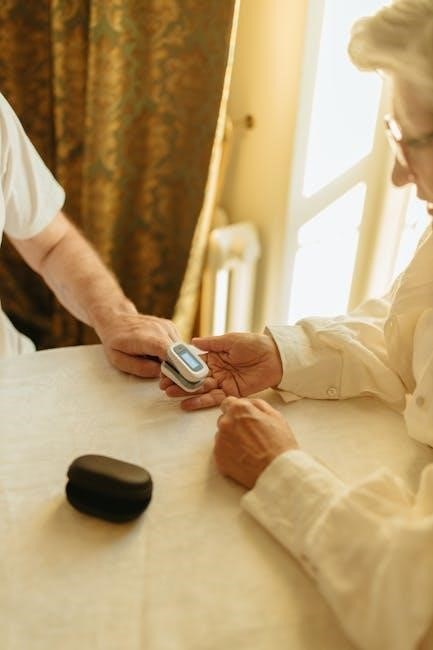Nursing assistant care is foundational in healthcare‚ providing essential support to patients in various settings. The Hartman’s Nursing Assistant Care: The Basics textbook equips students with fundamental skills‚ emphasizing patient-centered care‚ safety‚ and professionalism. It covers critical topics like infection control‚ communication‚ and legal considerations‚ preparing aspiring nursing assistants for certification and real-world challenges in long-term care‚ hospitals‚ and home healthcare environments.
The Role and Responsibilities of Nursing Assistants
Nursing assistants play a vital role in healthcare‚ providing direct patient care under the supervision of registered nurses. Their responsibilities include assisting with daily living activities‚ such as bathing‚ dressing‚ and feeding patients. They also monitor vital signs‚ ensure patient safety‚ and maintain a clean environment. Nursing assistants support medical staff with tasks like transferring patients and preparing them for exams. Effective communication and empathy are essential in their role‚ as they often serve as the primary point of contact for patients. Their work is foundational in promoting patient well-being and dignity across various healthcare settings.
Essential Qualities of a Nursing Assistant
Nursing assistants must possess strong communication skills‚ empathy‚ and a patient-centered approach to deliver compassionate care. They should demonstrate professionalism‚ reliability‚ and cultural competence to cater to diverse patient needs. Essential qualities include attention to detail‚ physical stamina‚ and the ability to work effectively in fast-paced environments. Nursing assistants must also uphold ethical standards‚ respect patient confidentiality‚ and maintain a positive attitude. These qualities ensure they provide high-quality care‚ support healthcare teams‚ and foster trust with patients and families across various healthcare settings.

Importance of Nursing Assistants in Healthcare Settings
Nursing assistants play a vital role in healthcare by providing direct‚ hands-on care to patients‚ ensuring their basic needs are met. They support registered nurses and other healthcare professionals‚ enabling efficient delivery of care. Their contributions enhance patient comfort‚ safety‚ and overall well-being. Nursing assistants are essential in long-term care facilities‚ hospitals‚ and home healthcare settings‚ where they assist with daily tasks‚ monitor patient conditions‚ and promote independence. Their role is crucial for maintaining high-quality patient care‚ supporting healthcare teams‚ and ensuring the smooth operation of healthcare systems.

Different Healthcare Settings for Nursing Assistants
Nursing assistants work in diverse healthcare environments‚ including long-term care facilities‚ hospitals‚ and home healthcare settings‚ requiring adaptability and a broad skill set to meet patient needs effectively.
Long-Term Care Facilities
Long-term care facilities provide ongoing support for residents with chronic conditions or disabilities. Nursing assistants play a vital role in these settings‚ assisting with daily living activities‚ monitoring health‚ and promoting independence. The Hartman’s Nursing Assistant Care: The Basics textbook emphasizes the importance of understanding residents’ body systems‚ managing conditions like dementia‚ and providing personalized care. These facilities require strong communication skills and adherence to infection prevention protocols. The textbook also highlights the need for cultural competence and respecting residents’ rights‚ ensuring holistic care in long-term settings.
Hospitals and Acute Care Settings
Hospitals and acute care settings demand a high level of efficiency and precision. Nursing assistants in these environments assist with patient admissions‚ monitor vital signs‚ and support medical procedures. They ensure patient safety‚ maintain infection control‚ and use specialized equipment. The dynamic nature of hospitals requires strong communication skills and quick decision-making. Hartman’s Nursing Assistant Care: The Basics provides training on emergency preparedness and safety protocols‚ equipping assistants to thrive in fast-paced acute care. Their role is crucial for smooth patient flow and effective care delivery in these demanding settings.
Home Healthcare and Community Care
Home healthcare and community care involve providing personalized support to patients in their own homes or community settings; Nursing assistants play a vital role in assisting with daily activities‚ administering medications‚ and monitoring health conditions. They also focus on promoting independence‚ safety‚ and comfort for patients. Hartman’s Nursing Assistant Care: The Basics emphasizes the importance of cultural competence‚ infection prevention‚ and effective communication in these settings. Home care often requires strong observational skills to identify changes in a patient’s condition and report them to healthcare providers‚ ensuring continuous‚ high-quality care in non-traditional medical environments.

Legal and Ethical Considerations in Nursing Assistant Care
Understanding HIPAA‚ patient privacy‚ and legal guidelines is crucial. Nursing assistants must navigate ethical dilemmas‚ respecting patient rights and dignity while adhering to professional standards of care.
Understanding HIPAA and Patient Privacy
Understanding HIPAA is essential for nursing assistants to protect patient privacy. The Health Insurance Portability and Accountability Act (HIPAA) mandates confidentiality of patient health information. Nursing assistants must ensure they only access necessary patient data and share it securely. Breaches can result in legal consequences‚ emphasizing the importance of adhering to privacy protocols. Proper training on HIPAA guidelines helps nursing assistants maintain ethical standards and build patient trust. This includes securing records‚ using encrypted communication‚ and verifying patient identity before sharing information. Compliance with HIPAA ensures a safe and respectful care environment.
Patient Rights and Advocacy
Patient rights and advocacy are central to nursing assistant care. Nursing assistants must respect patients’ autonomy‚ dignity‚ and right to informed consent. They ensure patients receive clear information about their care and involve them in decision-making. Advocacy involves supporting patients in expressing their needs and preferences‚ especially for those unable to communicate effectively. Nursing assistants must also protect patients from abuse‚ neglect‚ or exploitation‚ adhering to ethical and legal standards. By prioritizing patient-centered care‚ nursing assistants empower individuals to maintain control over their health and well-being‚ fostering trust and respect in the healthcare relationship.
Ethical Dilemmas in Nursing Assistant Practice
Ethical dilemmas in nursing assistant practice often arise in balancing patient autonomy‚ beneficence‚ and justice. Common challenges include confidentiality‚ end-of-life care decisions‚ and cultural differences impacting treatment preferences. Nursing assistants may face conflicts between adhering to patient wishes and following medical orders. Resource allocation and fairness in care delivery can also pose moral concerns. Additionally‚ navigating situations where patients refuse necessary care or express suicidal thoughts requires careful ethical reasoning. Training and support systems are essential to help nursing assistants address these dilemmas confidently‚ ensuring they provide compassionate and respectful care while upholding professional standards and patient rights.

Communication Skills for Nursing Assistants
Effective communication is vital for nursing assistants‚ involving clear verbal and non-verbal interactions. Active listening‚ empathy‚ and cultural competence ensure respectful and patient-centered care‚ fostering trust and understanding.
Verbal and Non-Verbal Communication
Effective communication involves both verbal and non-verbal skills. Verbal communication includes clear‚ concise‚ and empathetic speech‚ ensuring patients understand care instructions. Non-verbal cues‚ such as body language‚ facial expressions‚ and eye contact‚ convey empathy and attentiveness. Active listening is crucial‚ as it builds trust and ensures accurate understanding of patient needs. Cultural competence further enhances communication‚ respecting diverse backgrounds and preferences. Nursing assistants must balance these elements to provide compassionate‚ patient-centered care‚ fostering a supportive and inclusive environment for all individuals. This dual approach ensures clear‚ respectful‚ and effective interactions in healthcare settings.
Cultural Competence in Patient Care
Cultural competence is vital in patient care‚ as it ensures respectful and individualized support. Nursing assistants must understand diverse cultural beliefs‚ values‚ and practices to provide care that honors patients’ backgrounds. This includes being sensitive to language barriers‚ religious practices‚ and personal preferences. Promoting cultural awareness fosters trust and collaboration between healthcare providers and patients. By avoiding stereotypes and embracing diversity‚ nursing assistants can deliver care that respects each patient’s unique identity. This approach enhances patient satisfaction‚ improves outcomes‚ and creates a more inclusive healthcare environment‚ reflecting the importance of cultural sensitivity in all interactions.
I should mention the importance of detailed and accurate documentation. Maybe talk about how it helps in legal aspects‚ patient safety‚ and care coordination. Also‚ including examples like vital signs‚ treatments‚ and patient responses could be useful.
I need to avoid overlapping with other subheadings‚ so I shouldn’t discuss cultural competence or other topics here. Focus solely on reporting and documentation.
I should also ensure that the language is clear and concise‚ suitable for someone training to be a nursing assistant. Maybe include terms like “vital signs‚” “treatments administered‚” “patient responses‚” “legal purposes‚” “patient safety‚” and “care coordination.”
Now‚ structuring the paragraph: start with the importance of reporting and documentation‚ mention the key elements that should be included‚ and the reasons why they are important;
I need to count the words to make sure it’s exactly 93. Let me draft a sentence and then count.
“Reporting and documentation are critical components of nursing care‚ ensuring accurate communication among healthcare providers. Nursing assistants must maintain detailed records of patient interactions‚ including vital signs‚ treatments administered‚ and any notable responses. Timely and precise documentation helps in tracking patient progress‚ preventing errors‚ and ensuring continuity of care. It also serves legal purposes‚ providing a clear account of the care provided. By adhering to proper reporting and documentation standards‚ nursing assistants play a pivotal role in upholding patient safety and effective care coordination.”
Let me count the words:
Reporting
and
documentation
are
critical
components
of
nursing
care‚
ensuring
accurate
communication
among
healthcare
providers.
Nursing
assistants
must
maintain
detailed
records
of
patient
interactions‚
including
vital
signs‚
treatments
administered‚
and
any
notable
responses.
Timely
and
precise
documentation
helps
in
tracking
patient
progress‚
preventing
errors‚
and
ensuring
continuity
of
care.
It
also
serves
legal
purposes‚
providing
a
clear
account
of
the
care
provided.
By
adhering
to
proper
reporting
and
documentation
standards‚
nursing
assistants
play
a
pivotal
role
in
upholding
patient
safety
and
effective
care
coordination.
That’s . I need to reach 93. Maybe I can add a bit more detail.
“Reporting and documentation are critical components of nursing care‚ ensuring accurate communication among healthcare providers. Nursing assistants must maintain detailed records of patient interactions‚ including vital signs‚ treatments administered‚ and any notable responses. Timely and precise documentation helps in tracking patient progress‚ preventing errors‚ and ensuring continuity of care. It also serves legal purposes‚ providing a clear account of the care provided. Additionally‚ proper documentation aids in effective handovers between shifts and departments. By adhering to proper reporting and documentation standards‚ nursing assistants play a pivotal role in upholding patient safety‚ accountability‚ and efficient care coordination.”
Now‚ let’s count again:
Reporting
and
documentation
are
critical
components
of
nursing
care‚
ensuring
accurate
communication
among
healthcare
providers.
Nursing
assistants
must
maintain
detailed
records
of
patient
interactions‚
including
vital
signs‚
treatments
administered‚
and
any
notable
responses.
Timely
and
precise
documentation
helps
in
tracking
patient
progress‚
preventing
errors‚
and
ensuring
continuity
of
care.
It
also
serves
legal
purposes‚
providing
a
clear
account
of
the
care
provided.
Additionally‚
proper
documentation
aids
in
effective
handovers
between
shifts
and
departments.
By
adhering
to
proper
reporting
and
documentation
standards‚
nursing
assistants
play
a
pivotal
role
in
upholding
patient
safety‚
accountability‚
and
efficient
care
coordination.
Oops‚ that’s . I went over. Let me adjust.
“Reporting and documentation are critical components of nursing care‚ ensuring accurate communication among healthcare providers. Nursing assistants must maintain detailed records of patient interactions‚ including vital signs‚ treatments administered‚ and any notable responses. Timely and precise documentation helps in tracking patient progress‚ preventing errors‚ and ensuring continuity of care. It also serves legal purposes and aids in effective handovers between shifts and departments. By adhering to proper reporting and documentation standards‚ nursing assistants uphold patient safety‚ accountability‚ and efficient care coordination.”
Counting:
Reporting
and
documentation
are
critical
components
of
nursing
care‚
ensuring
accurate
communication
among
healthcare
providers.
Nursing
assistants
must
maintain
detailed
records
of
patient
interactions‚
including
vital
signs‚
treatments
administered‚
and
any
notable
responses.
Timely
and
precise
documentation
helps
in
tracking
patient
progress‚
preventing
errors‚
and
ensuring
continuity
of
care.
It
also
serves
legal
purposes
and
aids
in
effective
handovers
between
shifts
and
departments.
By
adhering
to
proper
reporting
and
documentation
standards‚
nursing
assistants
uphold
patient
safety‚
accountability‚
and
efficient
care
coordination.
That’s . I need to add a bit more.
“Reporting and documentation are critical components of nursing care‚ ensuring accurate communication among healthcare providers. Nursing assistants must maintain detailed records of patient interactions‚ including vital signs‚ treatments administered‚ and any notable responses. Timely and precise documentation helps in tracking patient progress‚ preventing errors‚ and ensuring continuity of care. It also serves legal purposes and aids in effective handovers between shifts and departments. By adhering to proper reporting and documentation standards‚ nursing assistants uphold patient safety‚ accountability‚ and efficient care coordination‚ which are essential for delivering high-quality patient care.”
Counting:
Reporting
and
documentation
are
critical
components
of
nursing
care‚
ensuring
accurate
communication
among
healthcare
providers.
Nursing
assistants
must
maintain
detailed
records
of
patient
interactions‚
including

vital
signs‚
treatments
administered‚
and
any
notable

responses.
Timely
and
precise
documentation

Basic Care Skills for Nursing Assistants

Infection Control and Safety in Nursing Assistant Care
Infection control and safety are vital in nursing care to prevent disease spread. Nursing assistants must use PPE and practice hand hygiene to protect patients.